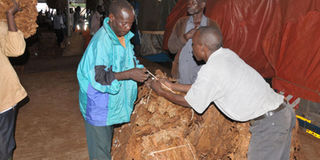Tobacco farmers earn Shs52b in 2013

Farmers deliver their tobacco for sale at a BAT purchasing centre in Hoima earlier this month Photo by Miriam Kabagunga.
What you need to know:
With the year coming to a close, farmers in two of Uganda’s biggest tobacco growing areas are making profits from turning in a good crop.
More than 15,000 farmers in the Bunyoro-Mubende and West Nile tobacco growing regions have earned a total of Shs52b from their sales of tobacco to British American Tobacco Uganda (BATU) this year.
Following the closure of the buying season in Bunyoro-Mubende, BATU has paid out Shs36b to 10,200 farmers for their crop. This one follows the West Nile buying season, where 4,700 farmers were paid Shs16b.
Speaking at a stakeholders’ meeting in Kibati, Hoima District, Jonathan D’Souza, the Managing Director, said: “The 2013 buying season in the Bunyoro-Mubende region has ended on high note and we are happy that our farmers fulfilled their promise to meet our leaf demand.”
Testimony
The farmers in Kibale, Hoima, Masindi, Kiryandongo, Kiboga and Kyankwanzi districts grew and sold 10 million kilogrammes of tobacco to honour their contract with BATU while the company invested up to Shs10b in supporting the farmers to grow an international quality crop.
“The disbursement of Shs36b in one tobacco growing region is a testimony to a commitment to invest in farmers,” D’Souza added.
“It also goes to show that we are a business deeply entrenched in the economy with support of various stakeholders.”
Bunyoro-Mubende closely follows West Nile buying season and by the end of all buying seasons in Uganda, it is anticipated that BATU would have paid out Shs58b to its 18,000 farmers in Uganda in 2013.
Partnership
“In 2013, we contracted farmers across Uganda to grow over 16 million kilogrammes of tobacco, over 90 per cent of which is exported. This will bring into the country over $50m in export revenue,” he explained.
Besides supporting the farmers to grow tobacco, BATU has spent Shs1.4b to support afforestation projects in both West Nile and Bunyoro-Mubende.
D’Souza attributed his company’s success to its business model that encourages partnership with its stakeholders.
“More importantly, all these achievements could not have been possible were it not for the support we have received from our stakeholders,” he added.
In 2012, the tobacco company paid Shs72b in taxes and, over the last two years, it has spent Shs27.5b in improving its buying and storage facilities in Arua, Hoima, Lira and Kihihi.
Regulation
However, despite the seemingly impressive figures, anti-tobacco groups argue that the crop is more harmful than beneficial to the farmers.
So, they are pushing for the adoption of the Tobacco Control Bill. A move that pits tobacco companies against these groups.
Highlighting this issue during the Kibati meeting, D’Souza urged that the regulation of the industry should be balanced, enforceable and evidence-based for all stakeholders of the tobacco industry and the economy.
“We endeavour to work closely with other industry players and regulators, sharing information that is required to help policy formulators understand our operating environment and develop sensible, balanced and enforceable appropriate policy and regulatory frameworks,” he said.




